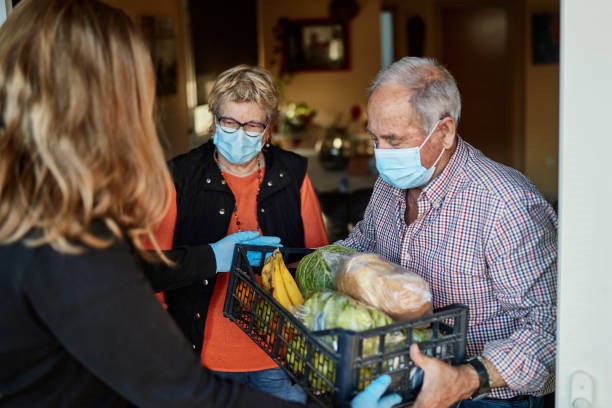Helping Is Healing
By Cindy Roe and Marie-Lise Baroutjian
 What happens when we help others? In thinking about this, our first thoughts might naturally gravitate towards empathy for the other person. If, for example, we let the person with only a few things in their hand go ahead of us in the grocery store checkout line, we might absentmindedly wonder if they’re having a rough day-maybe they forgot their lunch at home, or need to rush back to care for an ill child or elderly parent. So, we hope that our small act of kindness made their day just a little easier for them.
What happens when we help others? In thinking about this, our first thoughts might naturally gravitate towards empathy for the other person. If, for example, we let the person with only a few things in their hand go ahead of us in the grocery store checkout line, we might absentmindedly wonder if they’re having a rough day-maybe they forgot their lunch at home, or need to rush back to care for an ill child or elderly parent. So, we hope that our small act of kindness made their day just a little easier for them.
But do we ever stop to think about how helping someone else helps us? Apparently, helping others also has positive effects on our own mental and physical health and our overall sense of well-being.
What is Helping?
Another term for helping others, altruism can be thought of as a helpful act performed for others with no expectation of reward, or the unselfish concern for others. Because it lets us envision what someone else might be experiencing in their life at that moment, doing something that helps others helps us feel empathy and compassion towards them, which can drive increases in our own sense of gratitude. Since our human tendency is to compare ourselves to others, feeling empathetic and compassionate for another makes us better able to recognize and appreciate the things in our own lives that are going well.
Builds Social Reciprocity
The act of helping is like a 2-way street: not only are people who’ve been helped by others more likely to respond in kind to you or someone else in the future, acts of helping also serve to build and strengthen a sense of self-worth and belonging; helping someone else demonstrates to them that they are valued as a person, that they matter. Likewise for the helper; giving back to one’s community boosts a person’s sense of connection to the community, which in turn increases their self-esteem-so when we feel good about ourselves, we tend to feel less stress and anxiety.
Effective in Reducing Stress and Anxiety
In addition to the positive effects just mentioned, engaging in helpful activities has been found to be an effective stress reduction strategy. Researchers who studied the relationship between altruism and health found that people who regularly spent 6 hours a week doing some kind of volunteer work reported lower levels of depression and an increase in life satisfaction when compared to non-volunteers. Additionally, physiological data on the volunteers indicated that the volunteer group had lower blood pressure readings than those who didn’t do volunteer work.
 So why does this work? Firstly, the social engagement inherent in helping other people redirects our focus and attention away from our own problems, and that change in perspective increases our own ability to cope with what life throws at us-so when we feel more confident in our ability to cope, our stress levels naturally decrease. Secondly, helping others gives us this rush of good feelings thanks to the release of neurochemicals such as oxytocin, dopamine, serotonin, and endorphins by the brain.
So why does this work? Firstly, the social engagement inherent in helping other people redirects our focus and attention away from our own problems, and that change in perspective increases our own ability to cope with what life throws at us-so when we feel more confident in our ability to cope, our stress levels naturally decrease. Secondly, helping others gives us this rush of good feelings thanks to the release of neurochemicals such as oxytocin, dopamine, serotonin, and endorphins by the brain.
Tips for Lending a Helping Hand
So now that you know how we can help ourselves by helping others, are you feeling inspired to get going but maybe unsure where to start? Here’s some helpful tips to get you started:
- Stay local- Volunteering your time to help others doesn’t have to involve traveling far; since even very rural areas have community-based groups such as fire departments, ambulance corps, and libraries, look into what opportunities are available in your locale. It’s a great way to strengthen your sense of connection to your community and expand your social circle.
- How’s the neighbors? Another option for close-to-home helping would be to check in on your neighbors; offers of pet walking or runs to the grocery store would likely be welcome to busy working families, the elderly, or anyone who’s recovering from an illness or surgery. Or if you’re keen in the kitchen, drop off some heat-and-eat homecooked meals or fresh-baked goodies that you can package in takeout containers from the dollar store for a no muss, no fuss, socially distanced act of kindness.
- Channel your talents-brainstorm ways to help others by considering what you already know or the activities that you enjoy doing, and lend your expertise to others. Are you into gardening or crafts? Start up a mommy/daddy and me class to teach the little ones how to paint or how things grow; not only would you be helping each group member individually; you’d also be fostering a sense of community among all participants while getting to know some new people.
- Fuel your interests-has something new recently caught your interest, or is there an activity that you’ve always wanted to try? Reach out to someone who does that certain something and offer your time and help as their assistant. You’ll gain a mentor while simultaneously helping others who are also new to that activity. The best way to learn something is to teach it to others, after all.
- Start small-by devoting a small amount of your time or money to your chosen volunteering endeavor. Remember, the purpose of helping is for both you and the recipient to feel good about what you’re doing; overcommitting to a cause can lead to your losing interest in it altogether.
- Check out this short video by Independent Living’s own Robert Ferrer for more information on the relationship between helping others and personal stress.
Visit Independent Living Inc on Facebook, Instagram, or on the web at www.myindependentliving.org for more tips and videos on stress management techniques and coping strategies. Prefer to talk? Call us at 845-762-2275 to speak to one of our trained Crisis Counselors – we’re always happy to share information on managing stress or to offer a compassionate, listening ear.
References
Appello, L. (n.d.). When helping others is healing to ourselves. [Web log]. Retrieved from https://lisaappelo.com/when-helping-others-is-healing-to-ourselves/
Cherry, K. (2020, Nov 18). What is altruism? [Web log]. Verywellind.com. Retrieved from https://www.verywellmind.com/what-is-altruism-2794828#:~:text=Altruism%20is%20the%20unselfish%20concern%20for%20other%20people%E2%80%94doing,of%20concern%20for%20the%20well-being%20of%20other%20people.
Mills, H., Reiss, N., & Dombeck, M. (n.d.). Socialization and altruistic acts as stress relief. [Web article]. Grace Point Wellness. Retrieved from https://www.gracepointwellness.org/117-stress-reduction-and-management/article/15677-socialization-and-altruistic-acts-as-stress-relief
Neha, D. (n.d.). In helping others you help yourself. [Video]. Retrieved from https://doctorneha.com/in-helping-others-you-heal-yourself/
Scott, E. (2020, Oct 16). Helping others can increase happiness and reduce stress. [Web log]. Verywellmind.com. Retrieved from https://www.verywellmind.com/stress-helping-others-can-increase-happiness-3144890

